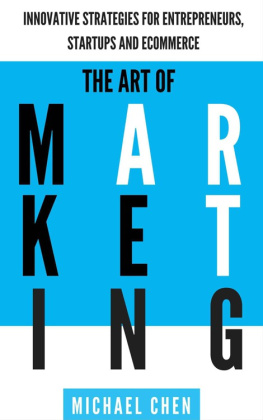MARKETING THROUGH TURBULENT TIMES
MARKETING THROUGH TURBULENT TIMES
Jenny Darroch
Peter F. Drucker and Masatoshi Ito
Graduate School of Management


Jenny Darroch 2010
All rights reserved. No reproduction, copy or transmission of this publication may be made without written permission.
No portion of this publication may be reproduced, copied or transmitted save with written permission or in accordance with the provisions of the Copyright, Designs and Patents Act 1988, or under the terms of any licence permitting limited copying issued by the Copyright Licensing Agency, Saffron House, 6-10 Kirby Street, London EC1N 8TS.
Any person who does any unauthorized act in relation to this publication may be liable to criminal prosecution and civil claims for damages.
The author has asserted her right to be identified as the author of this work in accordance with the Copyright, Designs and Patents Act 1988.
First published 2010 by
PALGRAVE MACMILLAN
Palgrave Macmillan in the UK is an imprint of Macmillan Publishers Limited,registered in England, company number 785998, of Houndmills, Basingstoke, Hampshire RG21 6XS.
Palgrave Macmillan in the US is a division of St Martins Press LLC, 175 Fifth Avenue, New York, NY 10010.
Palgrave Macmillan is the global academic imprint of the above companies and has companies and representatives throughout the world.
Palgrave and Macmillan are registered trademarks in the United States,the United Kingdom, Europe and other countries.
ISBN: 978-0-230-23730-8
This book is printed on paper suitable for recycling and made from fully managed and sustained forest sources. Logging, pulping and manufacturing processes are expected to conform to the environmental regulations of the country of origin.
A catalogue record for this book is available from the British Library.
A catalog record for this book is available from the Library of Congress.
10 9 8 7 6 5 4 3 2 1
19 18 17 16 15 14 13 12 11 10
Printed and bound in China
Illustrations
Tables
6.1 The ten global industrial classification system (GICS) sectors
6.2 Measures used in the study
6.3 The impact of spending ahead of the industry average
8.1 Murrays psychogenic needs
11.1 Car survey
Figures
5.1 Strategic orientations
7.1 A perceptual map of hotels for business travelers
8.1 Problems and solutions
9.1 The consumer decision-making process
9.2 Strategic vision vs. strategic opportunism
10.1 Ideal points and market entry
Foreword
WE LIVE IN INTERESTING TIMES
Cycle compression is evident all around us. Digital technology and mass media have forever changed the average length of major events: events that would have spanned decades in past centuries play out in years, or even months in our time. In his path breaking book, The Singularity futurologist Ray Kurzweil refers to the inability of the human brain to comprehend a constant rate of change the times we live in are only set to become even more interesting.
Witness the current recession, already the deepest since the Great one. Emerging from the depths of this recession there is a good chance that global consumers will never behave in the same credit-crazed, free-spending ways again. Or will they? Or will the old behavior morph into something new? What lies ahead? What other shocks await our global, interconnected markets that impact lives of farmers in India and traders in New York with breathtaking synchronicity.
Against this backdrop, the hapless CEO is desperately trying to make three, five, and even ten year bets of resource allocation, whilst fielding the intense scrutiny of customers, employees, and shareholders. Leading an organization during such trying times is, to put it mildly, challenging. Uncertainty often encourages risk aversion, which in turn leads to analysis-paralysis and organizational rigor mortis. But todays environment also offers a unique opportunity to leap ahead of the competition by embracing the new world order and managing with, rather than against, change.
ZIG WHEN THEY ZAG
Marketing through Turbulent Times is a timely book. Jenny Darroch provides an excellent overview of the current economic times and links together the disparate themes of recession, democracy, and individual depression and explores the role of social media and democracy. The recent fall-out from the election in Iran is only one compelling example of social media giving newfound power to the commons.
We know that social media is here to stay. We also know that social media has already substantially altered the way in which we communicate. The challenge for CEOs and marketing managers today is to embrace this technology and, instead of ignoring technology that might be hard to fully understand, embrace it and become leaders in the formation of best practices. Rather than allowing the current economic times to become an excuse for inactivity, Marketing through Turbulent Times aims to provide a roadmap for leaders wanting to grow their organization or start new ventures.
Embracing and enabling change is certainly consistent with high-tech companies such as Google, eBay, Skype, PayPal, but it also applies to companies in more established industries. No corner of the industrial landscape will remain untouched by the forces of this change.
GOOD LUCK BEATS GOOD STRATEGY
The traditional approach to managing change has often involved building detailed scenarios of the future and planning for alternative scenarios and understanding sensitivities. However, this approach is fraught with issues. To quote Yogi Berra, it is tough to make predictions especially about the future! Luck beats strategy any day. A far better approach is to maximize your chances of luck. Execute against a variety of promising avenues. Open the company to information from outside. Stay close to start-ups in your industry. Delete the word cannibalization from your corporate vocabulary. If you dont cannibalize yourself, someone else will. Any singular strategy that is built on a singular world-view of the future is highly likely to fail.
LESSONS FROM THE WORLDS MARKETPLACE
Drawing from my own background, apart from its obvious success, eBay also provides an excellent example of a healthy and functioning market that I believe has had a profound impact on the way consumers expect to be treated when doing business with any organization. With eBay, buyers have access to good information about the items they want to purchase and buyers only pay what they believe an item is worth. Sellers learn to communicate the value proposition of their items in a way that meets the needs of their target market. To be successful, sellers need to receive good feedback, and good feedback requires sellers to be customer focused. Marketing through Turbulent Times addresses these issues in the section covering growth through excellent execution of the current marketing strategy.
Further, by acquiring PayPal, eBay changed the nature of its business, which ultimately begs the question of What business are you in? Is diversification something to fear? No, not at all. What is important is to recognize the dynamic nature of business and therefore be willing to adapt as the organization evolves.
LESSONS FROM DRUCKER
Jenny Darroch encourages us to look at the business through customers eyes and to understand the needs customers seek to satisfy when using a product or service. As a former student of Peter Drucker, I am sure that he would have approved







![Heather Fitzpatrick [Heather Fitzpatrick] - Marketing Management For Non-Marketing Managers](/uploads/posts/book/124049/thumbs/heather-fitzpatrick-heather-fitzpatrick.jpg)



